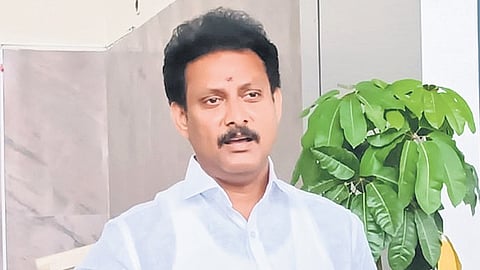

TIRUCHY/CHENNAI: School Education Minister Anbil Mahesh Poyyamozhi has strongly opposed the Central Board of Secondary Education’s (CBSE) move to implement a policy allowing schools to detain students in Classes 3, 5, and 8 if they fail to meet the required marks.
Addressing the media on Friday at Tiruchy International Airport, the minister urged parents across the state to speak out against the detention rule under National Education Policy (NEP), warning that it could cause severe mental stress among students and drive up school dropout rates.
“Parents are already under pressure, many of them take loans to enrol their children in CBSE schools. Adding the fear of failure will only increase their burden,” he said.
The minister said the move is “unacceptable” and harmful to the psychological well-being of children. “How can children at the age of eating chocolates be expected to handle the trauma of failure?” he asked.
He also warned that scrapping the no-detention policy could reverse years of effort in reducing dropouts. Reaffirming Tamil Nadu’s commitment to the Right to Education (RTE) Act, which ensures all pass up to Class 8, Poyyamozhi recalled that the state had rejected similar detention policies in 2019 and will continue to do so.
Poyyamozhi also criticised the centre’s push for centralised education reforms through NEP and NCERT textbooks. “Every state knows what its children need. Imposing a one-size-fits-all system is dangerous,” he said, and urged parents, and teachers to oppose the CBSE policy and safeguard children’s right to stress-free, inclusive education.
After news surfaced on Friday that CBSE schools are asking parents to sign consent letters (for ‘detention policy’) during the admission process, the DMK students’ wing demanded its withdrawal.
In a statement released in Chennai, the party’s student wing secretary R Rajiv Gandhi alleged that the parents were forced to sign the consent letters. He accused the centre of attempting to jeopardise students’ future through the NEP.
“Failing students in primary classes will only result in pushing them back into their hereditary occupations. This seems to be the objective of the Union government. For courses such as engineering, and medicine, entrance exams have been made compulsory. The CBSE syllabus has been prioritised for these exams. Now, they have made CBSE schools inaccessible,” he alleged.
Marumalarchi Makkal Iyakkam founder V Eswaran petitioned the state child rights commission seeking action against CBSE’s move to implement this policy. He told TNIE that the CBSE in 2024 replied to the Madras HC in a case related to the Right of Children to Free and Compulsory Education Act 2009, that the board has minimum control over the CBSE-affiliated school which wants to follow the CBSE curriculum, and in all other procedures schools will function within the legal provisions of the respective state government.
After the CBSE told the court that fixing fees in CBSE schools and implementing the RTE Act are within the power of the state, Eswaran stressed that if the CBSE schools act against it, the state can take legal action.